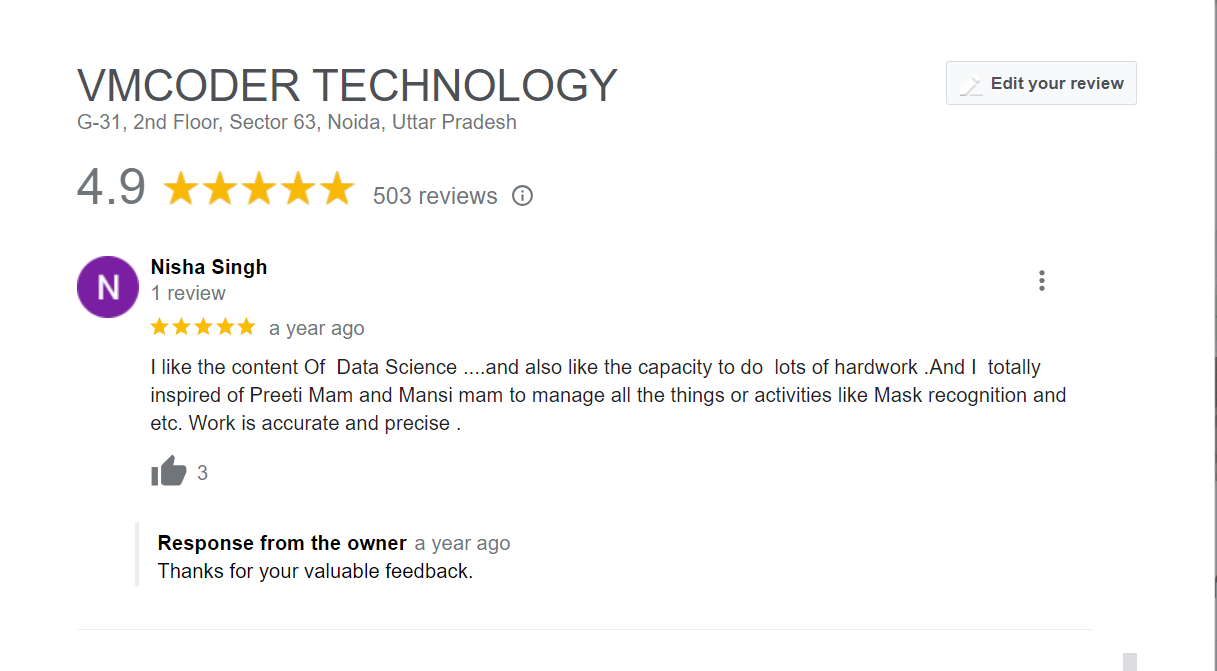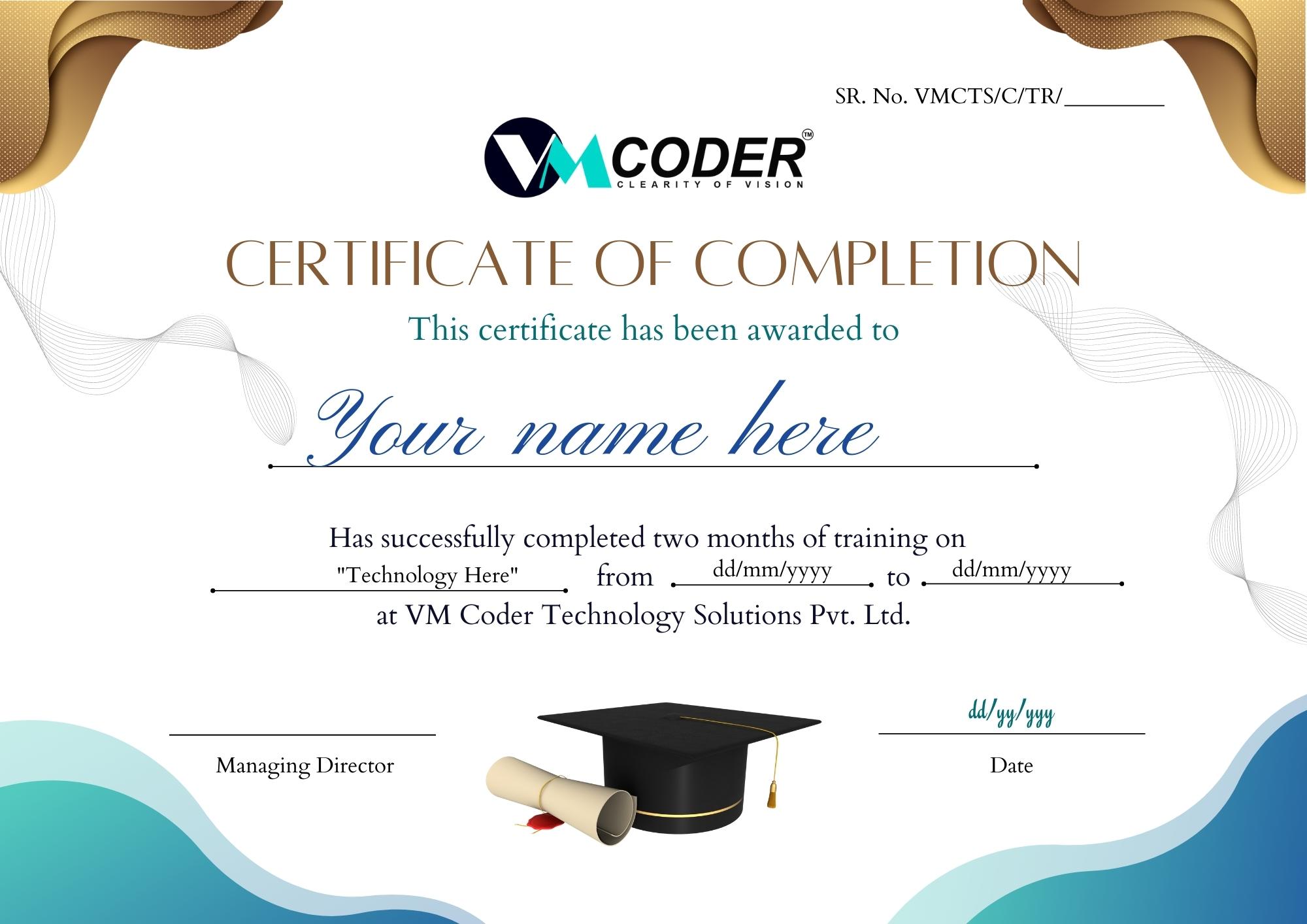Our Courses Overview
VM Coder is an organization that offers digital marketing certification training to students who want to build a strong career in the field of IT. The digital marketing training provided by VM Coder focuses on equipping students with the knowledge and practical skills required to succeed in the ever-evolving digital marketing industry.
Here's an overview of how VM Coder provides IT-based training in digital marketing:
1. Comprehensive Curriculum: VM Coder offers a well-structured curriculum that covers various aspects of digital marketing, including search engine optimization (SEO), social media marketing, pay-per-click (PPC) advertising, content marketing, email marketing, analytics, and more. The training program is designed to provide a comprehensive understanding of digital marketing strategies and techniques.
2. Experienced Instructors: The training is conducted by experienced instructors who have expertise in digital marketing. These instructors have practical industry experience and possess in-depth knowledge of the latest trends and best practices in the field. They deliver the course content effectively and provide insights based on their real-world experiences.
3. Hands-on Projects: VM Coder emphasizes hands-on learning to help students apply their knowledge in practical scenarios. Students work on real-world projects that simulate digital marketing campaigns, giving them the opportunity to implement strategies, analyze results, and optimize their campaigns. This practical approach helps develop valuable skills that are directly applicable in the industry.
4. Industry-Relevant Tools and Technologies: VM Coder ensures that students gain exposure to industry-relevant tools and technologies used in digital marketing. They provide access to tools such as Google Analytics, Google Ads, social media management platforms, and email marketing software. By using these tools during the training, students become familiar with their functionalities and gain practical experience.
5. Support and Guidance: VM Coder provides ongoing support and guidance to students throughout the training program. Instructors are available to answer questions, provide feedback on projects, and offer guidance on industry trends and best practices. This support helps students stay on track, enhance their learning experience, and gain a deeper understanding of digital marketing strategies.
6. Certification: Upon successful completion of the digital marketing certification training, VM Coder awards students with a certification that validates their skills and knowledge in the field. This certification demonstrates their proficiency to potential employers and can enhance their career prospects in the digital marketing industry.
7. Career Assistance: VM Coder offers career assistance services to students, helping them prepare for job interviews, refine their resumes, and connect with potential employers. They provide guidance on career paths within the digital marketing field and offer insights into industry trends, job opportunities, and professional development.
In summary, VM Coder provides digital marketing certification training that offers a comprehensive curriculum, hands-on projects, experienced instructors, access to industry-relevant tools, ongoing support, certification upon completion, and career assistance. By enrolling in this training program, students can acquire the necessary skills and knowledge to build a strong career in the dynamic and ever-expanding field of digital marketing.
Apply For Training
CURRICULUM & PROJECTS
- Introduction to Digital Marketing
- Overview of digital marketing
- Importance and benefits of digital marketing
- Digital marketing trends
- Website Creation and Optimization
- Domain registration and hosting
- Web design principles
- Search engine optimization (SEO)
- User experience (UX) design
- Search Engine Marketing (SEM) and Pay-Per-Click (PPC) Advertising
- Google AdWords and Bing Ads
- Keyword research and selection
- Ad creation and optimization
- Campaign management and analytics
- Social Media Marketing
- Social media platforms (Facebook, Twitter, Instagram, LinkedIn, etc.)
- Content creation and curation
- Social media advertising
- Community management and engagement
- Content Marketing
- Content strategy and planning
- Content creation (blog posts, articles, videos, infographics, etc.)
- Content distribution and promotion
- Content analytics and optimization
- Email Marketing
- Building an email list
- Email campaign creation and automation
- Email marketing best practices
- Email analytics and optimization
- Mobile Marketing
- Mobile advertising
- App marketing and optimization
- SMS marketing
- Location-based marketing
- Analytics and Data-driven Marketing
- Google Analytics and other analytics tools
- Key performance indicators (KPIs) and metrics
- Data analysis and interpretation
- Conversion tracking and optimization
- Online Reputation Management (ORM)
- Monitoring online presence
- Managing online reviews and ratings
- Handling customer feedback and complaints
- Building a positive brand image
- Digital Marketing Strategy and Planning
- Setting marketing goals and objectives
- Target audience identification
- Marketing budgeting and resource allocation
- Measurement and Reporting
- Skill Development: Training programs provided by companies are designed to enhance specific skills required for the job. These programs can help individuals acquire new knowledge, improve existing skills, and stay updated with the latest industry trends.
- Career Advancement: Company-sponsored training often focuses on developing employees' competencies and preparing them for career growth opportunities. By participating in training programs, individuals can enhance their qualifications, increase their value to the company, and potentially open up new avenues for promotion or better job prospects.
- Increased Productivity: Well-structured training programs can improve employees' efficiency and effectiveness in their roles. By equipping individuals with the necessary knowledge and skills, companies can enhance overall productivity, leading to better performance and outcomes for both employees and the organization.
- Standardization and Quality Assurance: Training programs help establish standard procedures and best practices within an organization. By ensuring that employees are trained consistently, companies can maintain quality standards across different teams and departments, leading to better outcomes, customer satisfaction, and overall operational excellence.
- Personal Growth and Confidence: Training programs not only focus on professional skills but also contribute to personal growth. Employees gain confidence, expand their knowledge base, and develop a broader perspective through exposure to new ideas and experiences. This personal growth can have positive effects on both professional and personal aspects of their lives.
Training helps in to grow your career.
Google Reviews Of
VM Coder Technology









Effective Growth Strategies, Converting Websites & Online Marketing.
Obtain Your Accreditation
Showcase Your Accomplishments

Placement Support

Career Advisor

Mock Interviews

Coding Quiz








 VM Coder provides best training and they also prepare you for interview and now I am working as a Python developer in a IT company with a good salary package.
VM Coder provides best training and they also prepare you for interview and now I am working as a Python developer in a IT company with a good salary package.





